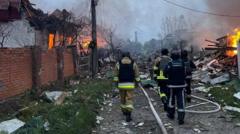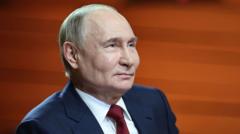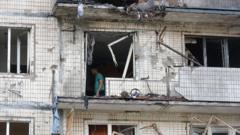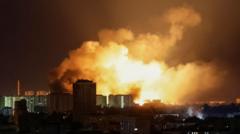The prospect of holding elections during a tumultuous war has led to debates on legitimacy and public sentiment in Ukraine.
**Zelensky Faces Pressure as Speculations of Early Elections Heat Up in Ukraine**

**Zelensky Faces Pressure as Speculations of Early Elections Heat Up in Ukraine**
Amid ongoing war, discussions of potential elections in Ukraine create tension and uncertainty.
As Ukraine endures relentless bombardments from Russia, the idea of elections might seem out of reach. Yet, in the capital, Kyiv, conversations about returning to the polls are resurfacing amidst growing speculation surrounding President Volodymyr Zelensky's intentions. Although electoral aspirations have previously been shelved due to the ongoing conflict, fresh rumors suggest that the President might be contemplating an expedited election schedule as ceasefire discussions unveil.
The political landscape has been tumultuous since the suspension of the presidential elections initially slated for 2024 under martial law, which was implemented following Russia's invasion two years prior. Despite this, the Kremlin has continued to label Zelensky as an illegitimate leader, insisting new elections are essential for any ceasefire compromise.
Recent media reports have hinted that internal discussions regarding an election may have taken place, with suggestions that preparations could commence should Russia agree to a ceasefire—potentially by Easter. However, government sources quickly rebuffed these claims, asserting that the priority remains achieving peace over electoral processes.
Public sentiment continues to shift as some observers believe that Zelensky's bolstered approval ratings may warrant a second term if he extends an olive branch for early elections. According to a recent poll, public trust in the President rose to 69% following high-profile criticism from figures like Donald Trump. Some diplomats speculate that Zelensky sees this as an opportune moment to solidify his position before political fractures emerge post-war.
The current legal framework doesn't favor immediate elections; changes would be necessary for any votes to take place, as martial law must first be lifted. Some suggest that the upcoming parliamentary vote in early May could provide an opening for Zelensky to announce elections in the summer, reigniting discussions around the delicate balance of power amidst a war-torn nation.
While supporters of early elections cite possible avenues for inclusive voting—such as utilizing the Diia app for displaced citizens—skepticism remains. Many express concerns over its reliability, the ability to maintain security during polling, and the growing dissent among the populace regarding the desire for elections during a time of war. A recent survey indicated that 78% of Ukrainians oppose holding elections, emphasizing the complexity of the situation.
As Zelensky navigates these turbulent waters, external pressures and shifting public sentiment could drastically affect Ukraine's political future in the face of an unrelenting conflict.
The political landscape has been tumultuous since the suspension of the presidential elections initially slated for 2024 under martial law, which was implemented following Russia's invasion two years prior. Despite this, the Kremlin has continued to label Zelensky as an illegitimate leader, insisting new elections are essential for any ceasefire compromise.
Recent media reports have hinted that internal discussions regarding an election may have taken place, with suggestions that preparations could commence should Russia agree to a ceasefire—potentially by Easter. However, government sources quickly rebuffed these claims, asserting that the priority remains achieving peace over electoral processes.
Public sentiment continues to shift as some observers believe that Zelensky's bolstered approval ratings may warrant a second term if he extends an olive branch for early elections. According to a recent poll, public trust in the President rose to 69% following high-profile criticism from figures like Donald Trump. Some diplomats speculate that Zelensky sees this as an opportune moment to solidify his position before political fractures emerge post-war.
The current legal framework doesn't favor immediate elections; changes would be necessary for any votes to take place, as martial law must first be lifted. Some suggest that the upcoming parliamentary vote in early May could provide an opening for Zelensky to announce elections in the summer, reigniting discussions around the delicate balance of power amidst a war-torn nation.
While supporters of early elections cite possible avenues for inclusive voting—such as utilizing the Diia app for displaced citizens—skepticism remains. Many express concerns over its reliability, the ability to maintain security during polling, and the growing dissent among the populace regarding the desire for elections during a time of war. A recent survey indicated that 78% of Ukrainians oppose holding elections, emphasizing the complexity of the situation.
As Zelensky navigates these turbulent waters, external pressures and shifting public sentiment could drastically affect Ukraine's political future in the face of an unrelenting conflict.




















